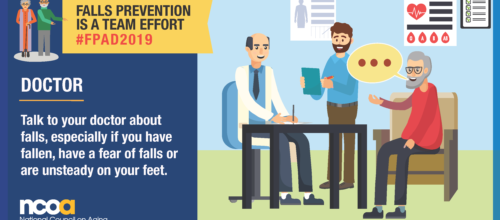
Today is Falls Prevention Awareness Day
The 12th annual Falls Prevention Awareness Day (FPAD) is today, September 23, 2019. Falls Prevention Awareness Day is sponsored by the National Council on Aging to raise awareness about how to prevent fall-related injuries among older adults and bring attention to this growing public health issue.
Falls are the leading cause of fatal and nonfatal injuries for older Americans. Falls threaten seniors’ safety and independence and generate enormous economic and personal costs. However, falling is not an inevitable result of aging. Through practical lifestyle adjustments, evidence-based falls prevention programs, and clinical-community partnerships, the number of falls among seniors can be substantially reduced.
According to the U.S. Centers for Disease Control and Prevention:
- One-fourth of Americans aged 65+ falls each year.
- Every 11 seconds, an older adult is treated in the emergency room for a fall; every 19 minutes, an older adult dies from a fall.
- Falls are the leading cause of fatal injury and the most common cause of nonfatal trauma-related hospital admissions among older adults.
- Falls result in more than 3 million injuries treated in emergency departments annually, including over 850,000 hospitalizations and more than 29,000 deaths.
- In 2015, the total cost of fall injuries was $50 billion.
- The financial toll for older adult falls is expected to increase as the population ages and may reach $67.7 billion by 2020.
Falls, with or without injury, also carry a heavy quality of life impact. A growing number of older adults fear falling and, as a result, limit their activities and social engagements. This can result in further physical decline, depression, social isolation, and feelings of helplessness.
Many people think falls are a normal part of aging. The truth is, they’re not. Most falls can be prevented and you have the power to reduce your risk. Below are six important steps that you can take to prevent a fall.
- Find a good balance and exercise program
- Look to build balance, strength, and flexibility.
- Find a program you like and take a friend.
- Talk to your health care provider
- Ask for an assessment of your risk of falling.
- Share your history of recent falls.
- Regularly review your medications with your doctor or pharmacist.
- Make sure side effects aren’t increasing your risk of falling.
- Take medications only as prescribed.
- Get your vision and hearing checked annually and update your eyeglasses
- Your eyes and ears are key to keeping you on your feet.
- Keep your home safe
- Remove tripping hazards, increase lighting, make stairs safe, and install grab bars in key areas.
- Talk to your family members
- Enlist their support in taking simple steps to stay safe. Falls are not just a seniors’ issue.
Source:
https://www.ncoa.org/healthy-aging/falls-prevention/
